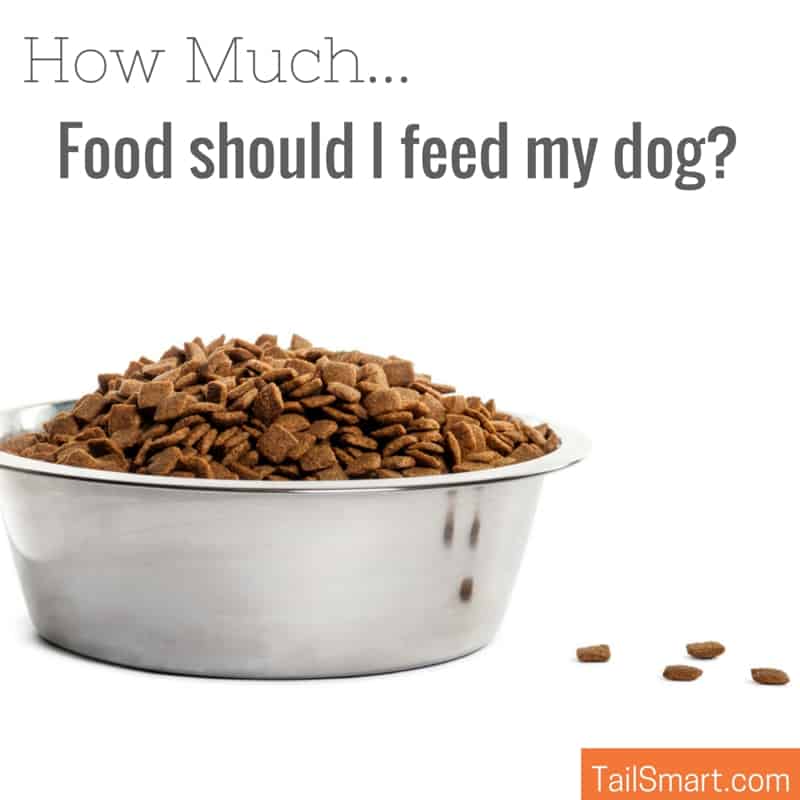
The goal is a happy and healthy dog. To achieve that goal, you want your dog to be a healthy weight. That means not too skinny but also not too fat. So, how much should you feed your dog?
The amount of food you give your dog depends on the dog’s size and activity level. You can start by having a look at the guide provided on dog food packages. Start at the low end of this guideline as they’re often overestimated. Monitor your dog’s hunger levels and weight and adjust his portions accordingly.
It’s best to feed your dog the same type of food and same brand every day. Dogs digestive systems don’t like changes in food, as it can cause an upset stomach and diarrhoea.
Puppies
Puppies should be fed three to four times a day with food formulated for puppies. Puppies need food with more protein and other nutrients to help them grow and develop. Once your pup is around five or six months of age, you can reduce the feeding schedule to twice a day.
Some experts recommend you hand feed your puppy as there are several advantages to doing this. First it’s a great bonding exercise! It’s a tremendous opportunity for you and your pup to get to know each other better. Secondly, your dog learns that you are the food provider. Thirdly, it helps to prevent the development of problems such as food possessiveness and aggression.
Adult dogs
Once a dog has reached the end of their first year, they’ve reached maturity and their nutritional requirements should stabilize. Your dog’s weight should also be stable and they should be happy, healthy and have grown into a well proportioned body composition. You should be able to identify your dog’s waist and you should be able to feel his ribs when you run your fingers over his body, beneath a thin layer of fat.
There are several ways you can feed your dog:
Free feeding
Free feeding means that you always have food available for your dog. Free feeding is easy to do and allows your dog to control when he eats and how much. If he has a day with more exercise, the dog can eat more and on lazy days the dog can eat less.
However, some dogs just cannot limit their eating and free feeding can then lead to obesity. Another downside is that it makes it harder to see changes in feeding habits or appetite that may be indicative of a health problem. Finally, insects or rodents may also find their way to the dog food bowl.
Meal feeding
Meal feeding means that you provide measured portions at specific times. This method makes it easy to potty train puppies as you know when to expect a bowel movement. This method is also helpful in controlling your dog’s weight and you can monitor changes in appetite. Another upside is that the dog knows that you are in control of food, recognizing you as his pack leader. Finally, this method reduces the chances of bloat (a medical emergency) and it also means that you are likely to be home if bloat does occur.
An argument against meal feeding is that it can lead to food aggression and some dogs may feel pressured to eat even when they’re not hungry. Furthermore, you may be unknowingly under- or over feeding your dog.
There are strong opinions among dog owners and professionals on whether free feeding or meal feeding is better. However, every dog is different and in the end, you have to decide what suits your dog’s personality and lifestyle.
Seniors
As dogs age, their nutritional requirements change. You still need to take into account your dog’s health and activity levels to decide what and how much to feed your dog, but it is a good idea to buy special senior dog food. A good senior formula contains more protein than adult dog food, as a healthy older dog needs a bit more protein to maintain healthy muscles.
If your dog has health problems he may need specially formulated food or supplements. In that case, talk to your vet about which foods to give and the correct quantities required.
Fussy eaters
Fussy eaters are usually created by their owners. If your dog has become a fussy eater, do not:
- free feed
- feed scraps from the table or while cooking
- overfeed treats
- dote on your dog, trying to encourage him to eat (it makes the not eating more interesting for him)
- mix anything into their food as it only teaches them to refuse food as they know you’ll be putting something more tasty in there eventually.
Although loss of appetite is an early sign of illness in dogs, the occasional missed meal should not be cause for concern. If there are no other symptoms, you don’t need to worry if your dog misses a few feeds as dogs can go quite a long time without eating. However, if there are other symptoms, you should consult your veterinarian.